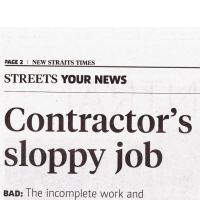The Unregulated World of Job Applicant Background Checks
 (graphic: New Straits Times)
(graphic: New Straits Times)
Background checks have become commonplace in hiring situations. It might be that you think you’ve got nothing to fear from an investigation—you know your history and it’s clean. But shoddy work by investigators can still knock you out of a job.
Take the case of Kevin A. Jones. According to Dan Fleshler of Quartz, Jones was about to get a job as a doorman and porter. The employer, Halsted Management, contracted with Sterling Infosystems to do an investigation on Jones. It found records of a Kevin M. Jones, who had at least three criminal convictions. Halsted withdrew the offer before Kevin A. Jones could correct the mistake.
Jones is now suing Sterling and Halsted. The suit, filed by Legal Action Center and Francis & Mailman, a Philadelphia law firm that specializes in consumer protection litigation, said the Jones mishap is part of a pattern in which Sterling “grossly and recklessly” sells information that it has failed to verify or is based on incomplete or false records, according to the New York Law Journal.
This wasn’t an isolated error. The background check industry is unregulated in the United States. A report (pdf) by the National Consumer Law Center (NCLC) shows that screening companies often mismatch people with records, fail to report crucial information about a case (such as when someone is arrested but found not guilty), access information that was supposed to be expunged from records and other errors.
It’s not like that everywhere. “Particularly in the European Union and increasingly across the developing world, a job applicant’s right to privacy trumps an employer’s right to collect information about a potential employee,” according to Workplace Management.
The NCLC recommends that state and federal agencies exert tighter control over investigative companies. Currently, the National Association of Professional Background Screeners (NAPBS) promotes accreditation, but the NCLC reports that only 21 of 2,137 companies in the NAPBS database are accredited.
It isn’t only private employers who rely on screening firms. Aaron Alexis, who was the shooter in the Washington Navy Yard, was vetted by USIS, a private firm contracted to do screens on federal contractors. Another person given a clean bill by USIS: Edward Snowden.
-Steve Straehley
To Learn More:
You Should Fear Background Checks Even If You’ve Done Nothing Wrong (by Dan Fleshler, Quartz)
Suit Alleges Background-Check Agency Mistakes (by John Caher, New York Law Journal)
Does Privatization of Federal Employee Background Checks Lead to More Security Breaches? (by Noel Brinkerhoff and Danny Biederman, AllGov)
How Errors by Criminal Background Checking Companies Harm Workers and Businesses (National Consumer Law Center)
- Top Stories
- Unusual News
- Where is the Money Going?
- Controversies
- U.S. and the World
- Appointments and Resignations
- Latest News
- Trump Orders ICE and Border Patrol to Kill More Protestors
- Trump Renames National Football League National Trump League
- Trump to Stop Deportations If…
- Trump Denounces World Series
- What If China Invaded the United States?






Comments